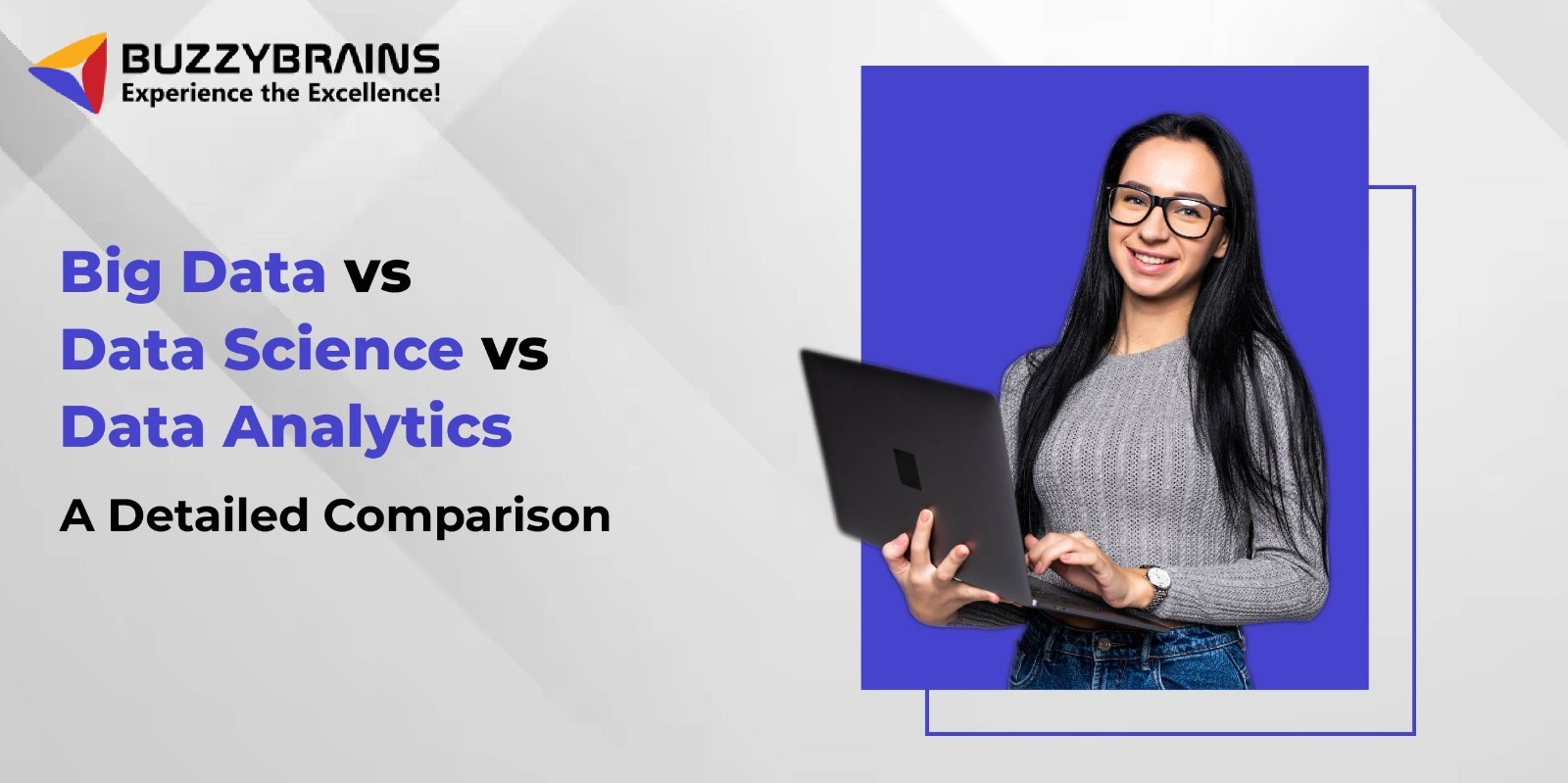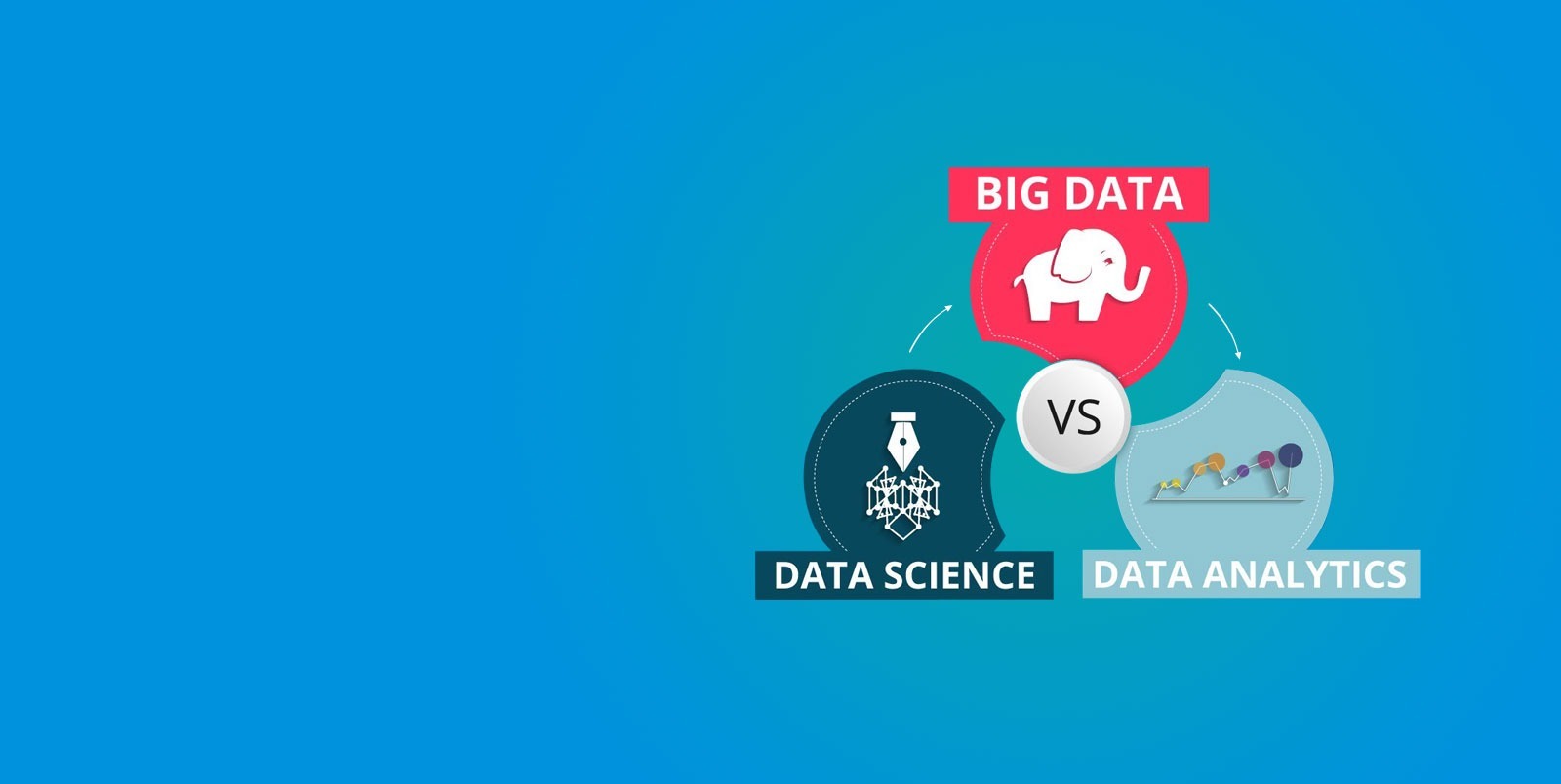Big Data Vs Data Science Vs Data Analytics: A Detailed Comparison

Big Data, Data Science and Data Analytics are interconnected disciplines that deal with data collection, processing, analysis and application. While they overlap in certain areas, there are also distinct differences between the three.
Understanding these nuances helps organizations maximize value by applying the right approach. This article provides an in-depth comparison between Big Data, Data Science and Data Analytics across key aspects.
- Understanding Big Data
- Understanding Data Science
- Understanding Data Analytics
- Big Data Vs Data Science Vs Data Analytics: Comparison Table
- Commonalities Between Big Data, Data Science and Data Analytics
- Key Considerations for Implementation
- FAQs About Big Data, Data Science and Data Analytics
- Conclusion
- Ready to Harness Your Data Potential? Let BuzzyBrains Lead the Way!
Understanding Big Data
What is Big Data?
Big Data refers to extremely large, complex datasets that traditional data processing cannot handle. It focuses on ingesting, processing, storing and managing such high volume, velocity and variety of data.
Focus and Objectives of Big Data:
The core focus of Big Data is on strategies and technologies to collect, store, process and structure large amounts of data from diverse sources. Key goals are scalability, speed, reliability, and management of data pipelines.
Skills Required for Big Data:
Big data systems require skills like Hadoop, MapReduce, Spark, NoSQL databases, stream processing, distributed programming, and cloud infrastructure.
Tools and Technologies for Big Data
- Hadoop
- Apache Spark
- Apache Flink
- Apache Kafka
- Apache HBase
- Apache Cassandra
- Apache Hive
- Apache Pig
- Apache Drill
- Apache Sqoop
- Apache Zeppelin
- Hadoop Distributed File System (HDFS)
- MapReduce
- Docker
- Kubernetes
- Amazon EMR
- Amazon Redshift
- Amazon Kinesis
- Google BigQuery
- Google Dataproc
- Google Dataflow
- Microsoft Azure HDInsight
- Microsoft Azure Databricks
- Microsoft Azure Synapse Analytics
- Apache NiFi
- Elasticsearch
How Big Data Enables Business Success?
By supporting large-scale data management and analytics, Big Data allows deriving valuable business insights that were not possible earlier, leading to innovation and optimized operations.
Application Areas of Big Data
Big data powers a range of applications like targeted marketing, user behaviour analysis, fraud detection, operational optimization, risk modelling, and IoT data processing.
Understanding Data Science
What is Data Science?
Data Science combines domain expertise, programming skills and knowledge of math and statistics to extract meaningful insights from structured and unstructured data. It utilizes advanced techniques like machine learning and statistical modelling.
Focus and Objectives of Data Science:
Data Science aims to uncover hidden patterns, unknown correlations and other useful information from data using specialized skills in math, stats, programming, modelling, machine learning, and visualization.
Skills Required for Data Science:
Data scientists need capabilities in statistics, R/Python programming, ML/DL algorithms, math modelling, algorithms, predictive analysis, and visualization.
Tools and Technologies for Data Science
- Python
- R
- Jupyter Notebooks
- Anaconda
- TensorFlow
- PyTorch
- scikit-learn
- Pandas
- NumPy
- Matplotlib
- Seaborn
- Plotly
- SQL
- Apache Spark
- Hadoop
- Apache Flink
- Apache Kafka
- Apache Hive
- Tableau
- Excel
- Power BI
- SAS
- MATLAB
- KNIME
- RapidMiner
- D3.js
- NLTK (Natural Language Toolkit)
- spaCy
- Gensim
- StatsModels
How Data Science Enables Business Success?
Advanced analytics and ML models built by data scientists can uncover hidden patterns to detect fraud, predict demand, identify risks, recommend products, and drive growth.
Application Areas of Data Science
Data science is applied in diverse domains like predictive maintenance, healthcare, recommendation engines, image recognition, NLP, autonomous vehicles, and smart assistants like Alexa.
Understanding Data Analytics
What is Data Analytics?
Data Analytics refers to techniques used to analyze datasets and drive fact-based planning, decision-making and execution. It enables organizations to optimize processes and uncover information.
Related Blog: Data Analytics: What It Is, How It’s Used, Types, Feature’s, Tools and Techniques
(Note this hyperlink is for Blog 34 which is yet to be be published, so hyperlink accordingly)
Focus and Objectives of Data Analytics:
The main emphasis of Data Analytics is on analyzing data to derive insights that can drive business strategy, planning and decision-making. Key objectives are enabling data-driven actions and optimizing business outcomes.
Skills Required for Data Analytics:
Data analytics calls for SQL querying, data mining, dashboarding, business intelligence, statistics, communication, and an understanding of business domains.
Tools and Technologies for Data Analytics
- Microsoft Excel
- Tableau
- Google Analytics
- Power BI
- SAS
- SQL
- Python
- R
- Apache Hadoop
- Apache Spark
- Apache Hive
- Apache Pig
- Apache Kafka
- Apache Flink
- Apache NiFi
- IBM SPSS
- MATLAB
- KNIME
- RapidMiner
- QlikView/Qlik Sense
- Alteryx
- Domo
- Looker
- Splunk
- Grafana
- Kibana
- Mixpanel
- Adobe Analytics
- HBase
- MongoDB
How Data Analytics Enables Business Success?
Data analytics provides data-driven insights about customers, performance, trends, industry dynamics. This leads to data-informed decision making across the organization.
Related Blog: Why Is Data-Driven Analytics Of Interest To Companies?
Application Areas of Data Analytics
Data analytics has broad application across sales, marketing, finance, operations, supply chain, strategic planning and management to drive data-based actions.
Big Data Vs Data Science Vs Data Analytics: Comparison Table
| Parameter | Big Data | Data Science | Data Analytics |
| Definition | Collecting and storing large, complex data from various sources | Using scientific processes and algorithms to extract insights from data | Techniques to analyze data to find actionable patterns and insights |
| Focus | Scalable data storage and management | Advanced statistical modelling and ML algorithms | Exploring data to inform decisions |
| Skills | Data engineering, distributed systems | Statistical modelling, ML engineering, analytics | Exploratory analysis, statistical methods |
| Tools | Hadoop, NoSQL databases, Spark | Python, R, Tensorflow, PyTorch | Tableau, Qlik, MATLAB, statistical software |
| Role | Foundation for large-scale analytics | Derive predictive insights from data | Enable data-driven decision-making |
| Impact | Enables complex analytics by managing volume, variety, velocity, veracity of data | Builds models to uncover hidden insights and predict unknown events | Provides metrics, trends, forecasts to optimize business outcomes |
| Applications | Digital marketing, social media, smart devices | Fraud detection, medical diagnosis, sentiment analysis, recommendations | Business intelligence, financial forecasting, operational analytics |
Commonalities Between Big Data, Data Science and Data Analytics
While having distinct focuses, Big Data, Data Science and Data Analytics also overlap in some aspects:
1. Shared Reliance on Data Processing and Analysis
All three rely on capabilities to store, process, clean, extract, analyze and interpret data to create business value. They form the core pillars of modern data management and analytics.
2. Contribution to Data-Driven Decision Making
These disciplines complement each other to enable data-driven decision-making through fact-based insights about the business, customer preferences, market dynamics, trends, and optimal strategies.
3. Integration in Business Operations
Leading companies integrate capabilities across big data, data science and analytics into their business operations, strategies, products and competitive positioning. They provide the data foundation.
Key Considerations for Implementation
Factors to consider when implementing big data, data science and analytics:
- Clear business objectives, use cases and ROI
- Integrated platform vs siloed solutions
- In-house team vs external consultants
- Hybrid and multi-cloud deployment
- Data governance, security and ethics
- Change management and cultural adoption
- Future scalability and flexibility
- Timeline, total cost of ownership and ROI
FAQs About Big Data, Data Science and Data Analytics
Q1. How do Big Data, Data Science, and Data Analytics relate to each other?
Big Data provides the infrastructure to store and process large amounts of data. Data Science analyzes this data for patterns. Data Analytics evaluates insights to drive business decisions.
Q2. What are some real-world applications of each discipline?
Big Data enables Netflix recommendations, Twitter trend analysis, and IoT data. Data Science powers fraud prediction, disease diagnosis, and chatbots. Data analytics drives business intelligence, marketing analytics, and operational optimization.
Q3. What are the primary goals of each discipline?
Big Data aims to store and process large, complex data. Data Science seeks to uncover new predictive insights. Data Analytics focuses on enabling data-backed business decisions.
Q4. What are the main challenges faced in each discipline?
Big Data faces issues around real-time processing, security, and siloed data. Data Science struggles with model interpretability, and overfitting. Data Analytics has adoption and data quality challenges.
Q5. What are some common misconceptions?
Big Data doesn’t always imply value without analytics. Data Science is more than just modelling. Analytics is not just visualizations but applying insights.
Conclusion
While Big Data, Data Science and Analytics have distinct scopes, they work best when integrated together. Organizations must assess their maturity, objectives and use cases to determine the right approach. With the exponential growth of data, leveraging these in combination can unlock immense value.
Ready to Harness Your Data Potential? Let BuzzyBrains Lead the Way!
BuzzyBrains helps global organizations design and implement Big Data, Data Science and Analytics capabilities tailored to their specific business context and objectives. Contact us today to start your data journey! Our end-to-end data services, proven methodologies, and domain expertise empower companies to convert data into strategic business assets.

